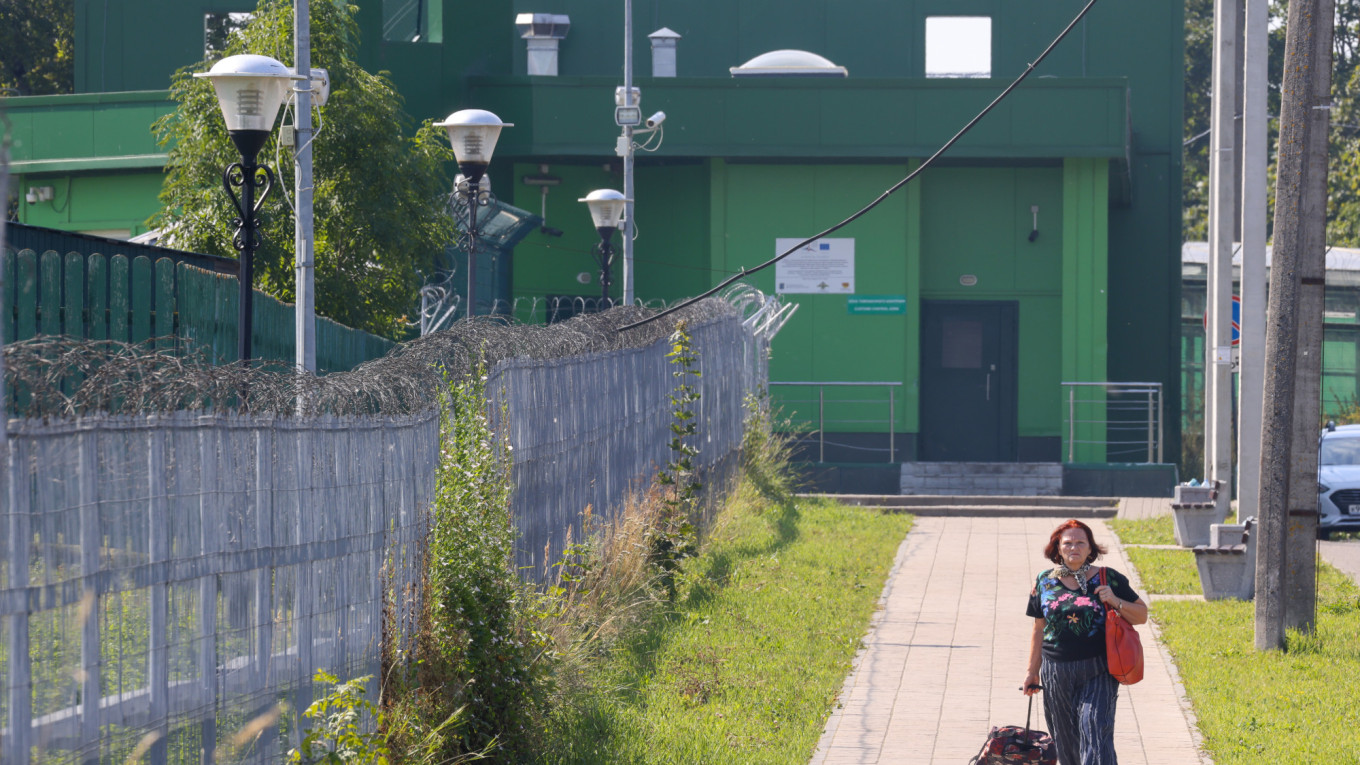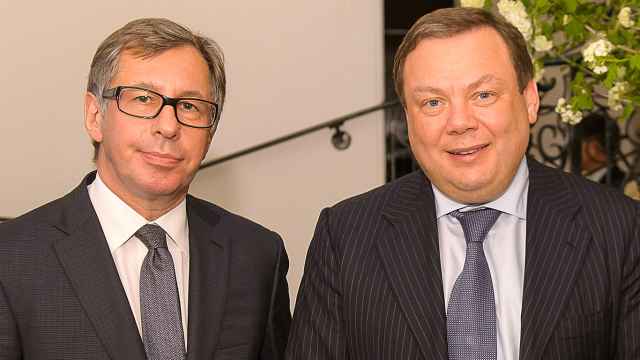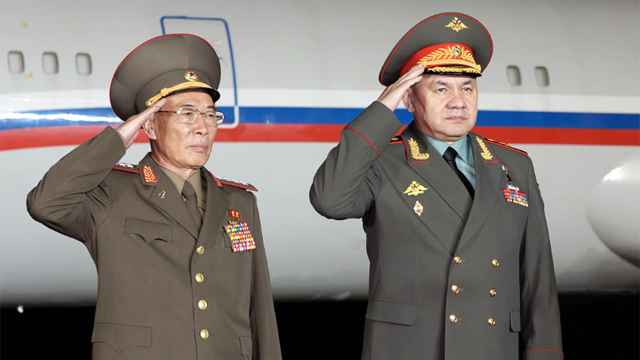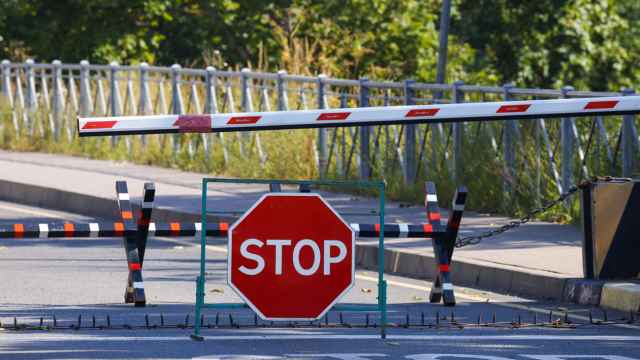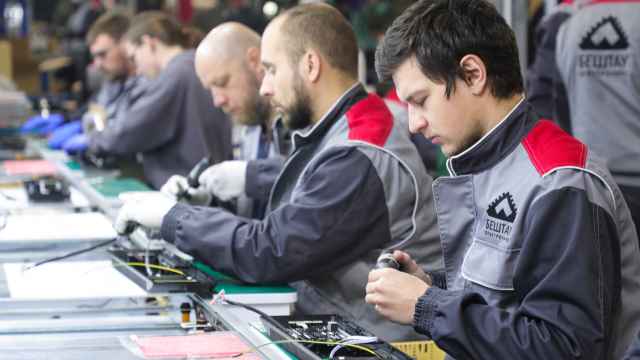A ban on Russian-registered vehicles by Moscow’s European Union neighbors appears set to hurt not only ordinary Russians but also political dissidents and Ukrainian refugees fleeing Russia.
Finland, Latvia, Estonia, Lithuania and Poland have implemented bans on passenger vehicles with Russian license plates in recent days amid intense debate over the enforcement of an EU directive on import restrictions in “connection with the brutal war in Ukraine.”
Travel options from Russia to Europe were already significantly limited due to mutual airspace bans and visa restrictions on Russian citizens passed after Moscow sent troops into Ukraine last February.
Russian activists who are helping Ukrainian refugees warn the vehicle ban will significantly hinder the evacuation from Russia of seriously ill and disabled people, many of whom require specialized assistance.
In one instance, a Ukrainian woman with terminal cancer who fled to Russia from the Kremlin-occupied Ukrainian city of Mariupol was forced to cross the Russian-Estonian border in a wheelchair on Sunday due to the ban, Grigory Mikhnov-Voitenko, a Russian priest and rights activist who assists Ukrainian refugees, told The Moscow Times.
After clearing the Russian checkpoint, the woman's son had to push his mother’s wheelchair one-and-a-half kilometers on foot, according to the BBC's Russian service, which first reported the incident.
According to Mikhnov-Voitenko, the ambulance driver transporting the woman was told by Estonian border officers that the vehicle would be seized if it crossed into Estonia.
While it’s unclear how many people will be affected by the ban. Mikhnov-Voitenko said that his team, which works with Ukrainian refugees, receives up to four requests for help from disabled people every week.
“This case was not the most difficult, since the woman was conscious and was accompanied by her relative,” Mikhnov-Voitenko said in a phone interview. “But we have situations when a person has to travel alone and has no companions on the other side of the border.”
The ban is also likely to impact Russian opposition figures seeking to leave the country amid its wartime crackdown on dissident voices, activists and independent journalists warn.
Jailed Kremlin critic Alexei Navalny’s team has called on Estonia, Latvia and Lithuania to reconsider the measure, arguing that it adversely affects anti-war Russians and adds fuel to the Kremlin's narrative of anti-Russian sentiment in the West.
The ban “contradicts normative provisions, generates absurd legal conflicts, harms opponents of [Russian President Vladimir] Putin’s regime who are forced to leave Russia, and gives the Russian authorities arguments for the propaganda machine,” Navalny’s Anti-Corruption Foundation (FBK) said in a letter to the three Baltic states last week.
Anastasia Burakova, a Russian lawyer and the head of Kovcheg, an international group supporting Russian emigres and anti-war activists, called the restrictions “quite strange,” given that these countries have already banned entry to Russians with EU tourist visas.
“The Baltic countries, in particular, know very well that entry to them is possible only for relatives of EU citizens [and people] with humanitarian visas that allow them to live in the country or with a residence permit,” she said.
While the entry bans were issued after the European Commission clarified that existing regulations prohibit the import or transfer of goods originating in Russia, “it is clear that those cars are unlikely to be sold there and this is not an export from the Russian Federation,” Burakova told The Moscow Times.
Independent journalist Roman Super, who fled Russia last year by crossing the EU border in his car, echoed the argument that the ban will harm Russians fleeing repression.
"This ban primarily targets Russians who are not pleased with the Russian state's policies, particularly those who oppose the war in Ukraine and are striving to distance themselves from it,” Super said.
“They are now unable to simply get into a car and drive to Europe to escape the oppressive situation in their country,” he added.
Those who advocate in support of the ban argue that it is part of the sanctions imposed on Russia in response to the ongoing conflict in Ukraine.
"A car registered in Russia has no right to enter Poland," Polish Interior Minister Mariusz Kaminski said last week.
"This is another element of the sanctions imposed on Russia and its citizens in connection with the brutal war in Ukraine, due to the fact that the Russian state today constitutes a threat to international security,” he continued.
Since the ban, Lithuania said it has barred at least 58 cars with Russian license plates from entering the country.
Finland announced that the restrictions would not apply to EU citizens and their close family members, diplomats or individuals travelling for humanitarian purposes.
Estonia also told the BBC on Monday that ambulances from Russia would be allowed to pass despite the ban.
“When an ambulance with Russian license plates arrives from Russia to Estonia, then, following the rules, we allow it to cross the border,” the Estonian Tax and Customs Board told the BBC, adding that it had not recorded any attempts by vehicles with Russian license plates to cross the border since the ban.
As for everyone else, private cars with Russian license plates appear to no longer be a feasible means of transportation into the EU.
"I think that political decisions will now be taken into account rather than just technical regulations,” Super told The Moscow Times, adding that he thinks the restrictions are most likely to “affect ordinary people” rather than the officials and elites responsible for the war.
“But how does this bring the end of the war closer? That’s what the authors of the sanctions have not addressed.”
A Message from The Moscow Times:
Dear readers,
We are facing unprecedented challenges. Russia's Prosecutor General's Office has designated The Moscow Times as an "undesirable" organization, criminalizing our work and putting our staff at risk of prosecution. This follows our earlier unjust labeling as a "foreign agent."
These actions are direct attempts to silence independent journalism in Russia. The authorities claim our work "discredits the decisions of the Russian leadership." We see things differently: we strive to provide accurate, unbiased reporting on Russia.
We, the journalists of The Moscow Times, refuse to be silenced. But to continue our work, we need your help.
Your support, no matter how small, makes a world of difference. If you can, please support us monthly starting from just $2. It's quick to set up, and every contribution makes a significant impact.
By supporting The Moscow Times, you're defending open, independent journalism in the face of repression. Thank you for standing with us.
Remind me later.



